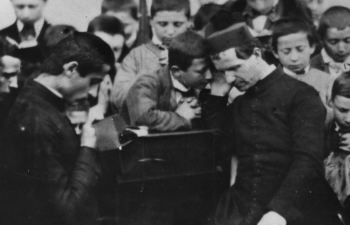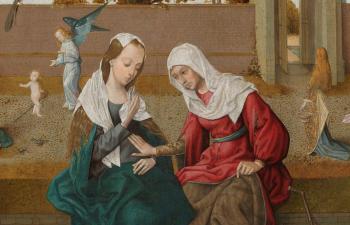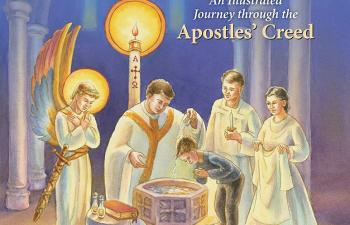‘At the heart of catechesis, we find in essence, a Person, the Person of Jesus Christ. The definitive aim of catechesis is to introduce people to an intimate friendship with Jesus Christ. Only He can lead us to the love of the Father in the Spirit and make us share in the life of the Trinity.’ In Catechesi Tradendae, Blessed Pope John Paul II stresses the centrality of Christ and establishes the essential link between evangelization and catechesis. There is no separation or opposition between catechesis and evangelization. They integrate and complement each other. Catechesis must often concern itself not only with nourishing and teaching the faith, but also with arousing it unceasingly, with the help of grace, with opening the heart, with converting and with preparing total adherence to Jesus Christ.
Anniversary
As the twentieth anniversary of the Catechism approaches on October 11, 2012, our goal as catechists is to help the whole community of faith to come to at least a basic standard of knowledge of Christ and of the teachings of the Church in such a way that the people of God are guided in living in these perilous and confusing days. The only answer to the confusion of our times is a thorough knowledge of the Truth and cooperation with the grace of God to live that knowledge to the full in preparation for the kingdom of heaven. What is being called for here is for all of us to see our relationship to Jesus Christ as the most central one of our lives, and that we recognize that ‘conversion of mind and heart’ to become more like Him every day is the true meaning and purpose of our lives.
Indeed, the 20th Anniversary of the Catechism is the same day as the beginning of the Year of Faith, called for by Pope Benedict XVI. The Year of Faith is an opportunity for all Catholics to deepen their faith and passion for Christ and his Church. Pastoral programs during the Year of Faith are encouraged at various levels of the Church; universal, episcopal conference, diocesan, parish, community, association and movements to impact all Catholics. The Holy Father offers the Catechism of the Catholic Church and the documents of the Second Vatican Council as foundational for the Year of Faith to deepen a love for faith and to profess it confidently and clearly to others. These documents will also help guide the discussions of the Synod on the New Evangelization for the Transmission of the Christian Faith, which will be taking place in Rome October 7-28, 2012. To help foster the New Evangelization in the United States, the ISCCB Committee on Evangelization and Catechesis has developed an online resource, Disciples Called to Witness: The New Evangelization. Disciples Called to Witness provides dioceses and parishes with resources to assist Catholics in renewing their faith and sharing it with others.
Renewal
In many ways, the Catechism of the Catholic Church marked the renewal of the catechetical effort in the United States. In Fidei Depositum, Blessed Pope John Paul II stated one goal of the Catechism, ‘This catechism is given to them that it may be a sure and authentic reference text for teaching catholic doctrine and particularly for preparing local catechisms’ (CCC p6).
Catechisms for private and devotional use are continuing to be developed from the Catechism. A multitude of local catechisms and texts have been produced by bishops, priests and publishing houses that reflect the Catechism. The Catechism has impacted the formation of the young in elementary and secondary education, as well as adult faith formation programs. The National Directory for Catechesis, approved by the United States Conference of Catholic Bishops (USCCB) in 2003, makes extensive reference to the Catechism and promotes the Catechism's use by providing sound catechetical principles within the context of evangelization.
The United States Catholic Catechism for Adults was published in 2006 by the USCCB as a local catechism for use in the territory of the United States. It takes into account the local situation and culture while preserving the unity of faith and remaining ‘in perfect harmony with the Catechism of the Catholic Church’ (General Directory for Catechesis, 284). It is my hope that each household, besides having a copy of the Bible and a manual of Catholic prayers, ought to have a copy of the Catechism of the Catholic Church and the U.S. Catholic Catechism for Adults so that parents can have a ready reference for study and prayer in their home. What better toolsare there for parents to form their own faith so as to be equipped to share it with their children?
The Catechism has permeated catechetical activities and pastoral ministries. Two examples include the 2009 United States Conference of Catholic Bishops' Pastoral Letter, ‘Marriage: Love and Life in the Divine Plan’ and the 2008 ‘Catechetical Formation in Chaste Living: Guidelines for Curriculum Design and Publication’ which use the Catechism extensively in its treatment of marriage, catechesis, catechetical texts and related topics. In addition to the documents and work of the USCCB, many individual bishops have offered programs on the Catechism for both the clergy and laity. To assist parishes in their pastoral ministry, catechetical publishers have produced a large number of resources based on the four pillars of the Catechism. The USCCB is even utilizing new media to promote the Catechism. Reflections, quotes and quizzes from the Catechism are regularly posted on the USCCB Facebook and Twitter pages.
In the last twenty years, the Catechism of the Catholic Church has deeply enhanced the life and teaching of the Catholic Church in the United States. It has solidified and clarified the Church's position on our treasured tradition since the days of the early Church and the flowering of the catechetical mission of the Church over the centuries. The Catechism is a complete and accurate exposition of Catholic doctrine. It contains the essential and fundamental context of the Catholic faith in a full and summary way. It presents what Catholics throughout the world believe, celebrate in the sacraments and live in morality always centered in prayer. The Catechism has been a unique gift to the Church and will continue to bear much fruit for the future. The twentieth anniversary of the Catechism and the Year of Faith are opportunities to renew the use and diffusion of the Catechism so that even more people may encounter the depth and richness of the Catholic faith through the Catechism of the Catholic Church.
This article is originally found on pages 10-11 of the printed edition.
This article is from The Sower and may be copied for catechetical purposes only. It may not be reprinted in another published work without the permission of Maryvale Institute. Contact [email protected]


















